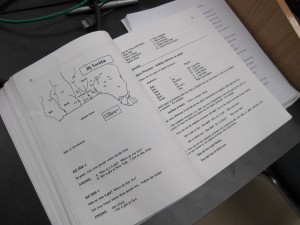I think today is the coldest I’ve experienced so far in Illinois. Looking at the weather temperature gauge, I am horrified by what I see and feel: it’s three degrees Centigrade! America uses the Fahrenheit system, and that would translate to something like forty. In Lagos today, it’s 86 degrees F (or 30 degrees C), yet as far as Illinois temperature is concerned, this is not even cold yet, but just the beginning. We’re still in the fall, heading towards the winter with almost zero degrees Fahrenheit. I still have plenty more days of sunlight before daylight savings time which comes with longer nights and shorter days.
Yesterday while looking through the photo album of a fellow FLTA in Colorado, I saw snow, and wondered aloud how this came to be. A little more inquiry tells me that I should indeed count my blessings. For right now, in October, the rocky mountain state of Colorado is already covered in snow. I can only imagine what it would be like over there in December, and February. Yes, I am counting my blessings even as I lay here freezing within a four-piece clothing that marks me out like a Soviet spy, and with smoke coming out of my mouth as I speak.
Lying in bed, I wonder why I no longer find warmth within its soft embrace. It used to be where to go and hide when everywhere else got cold. Now the cold bites more even from within the folds of the bed spread. One thing is sure now: I’d most likely spend more time in the hot shower now than I’ve done before. And sad but inevitably, the days of my bike riding are coming slowly to an end.
 “In Nigeria,” I said, half in jest, “students are not given to this much indulgence as you American students.” Back home, teachers take it upon themselves to surprise students in whichever possible way. Students would go into class one day just to discover a surprise test, with no way of knowing what to expect from the teacher. Do not get me wrong, this is not always a good thing. But here in America, not only did I have to give them the “areas of concentration” as we called it back home, with details of how I expect them to answer the questions, multiple choice or not, I was also made to promise that there would be at least a few more “extra credit” questions, set to help everyone get a chance to come out in good grades. To be clear, I do not have any problem with this. The students have worked so hard to overcome all linguistic and phonetic obstacles of learning Yoruba. It is only fair that the examination be made to test their knowledge, and not to punish their ignorance. Therefore, there would be multiple choice questions. There would also be fill-in-the-blanks, as well as questions requiring long and short sentences.
“In Nigeria,” I said, half in jest, “students are not given to this much indulgence as you American students.” Back home, teachers take it upon themselves to surprise students in whichever possible way. Students would go into class one day just to discover a surprise test, with no way of knowing what to expect from the teacher. Do not get me wrong, this is not always a good thing. But here in America, not only did I have to give them the “areas of concentration” as we called it back home, with details of how I expect them to answer the questions, multiple choice or not, I was also made to promise that there would be at least a few more “extra credit” questions, set to help everyone get a chance to come out in good grades. To be clear, I do not have any problem with this. The students have worked so hard to overcome all linguistic and phonetic obstacles of learning Yoruba. It is only fair that the examination be made to test their knowledge, and not to punish their ignorance. Therefore, there would be multiple choice questions. There would also be fill-in-the-blanks, as well as questions requiring long and short sentences.